by Deep Green Resistance News Service | Dec 1, 2017 | Strategy & Analysis
by Suzanna Jones
Editor’s note: Suzanna Jones is an off-the-grid farmer who lives in Walden, Vermont. She was among those arrested protesting the Lowell wind project in 2011. This originally appeared in VTDigger; republished with permission of the author.
There is a painful rift among self-described environmentalists in Vermont, a divide that is particularly evident in the debate on industrial wind. In the past, battle lines were usually drawn between business interests wanting to “develop” the land, and environmentalists seeking to protect it. Today, however, the most ardent advocates of industrial buildout in Vermont’s most fragile ecosystems are environmental organizations. So what is happening?
According to former New York Times foreign correspondent Chris Hedges, this change is symptomatic of a broader shift that has taken shape over many years. In his book “Death of the Liberal Class,” Hedges looks at the failure of the Left to defend the values it espouses – a fundamental disconnect between belief and action that has been corrupting to the Left and disastrous for society as a whole. Among other things, he argues, it has turned liberal establishments into mouthpieces for the power elite.
Historically, the liberal class acted as watchdog against the abuses of capitalism and its elites. But over the last century, Hedges claims, it has traded that role for a comfortable “seat at the table” and inclusion in “the club.” This Faustian bargain has created a power vacuum – one that has often been filled by right-wing totalitarian elements (think Nazi Germany and fascist Italy) that rise to prominence by ridiculing and betraying the values that liberals claim to champion.
Caving in to the seduction of careerism, prestige and comforts, the liberal class curtailed its critique of unfettered capitalism, globalization and educational institutions, and silenced the radicals and iconoclasts that gave it moral guidance – “the roots of creative and bold thought that would keep it from being subsumed completely by the power elite.” In other words, “the liberal class sold its soul.”
From education to labor to agriculture and environmentalism, this moral vacuum continues to grow because the public sphere has been abandoned by those who fear being labeled pariahs. Among the consequences, Hedges says, is an inability to take effective action on climate change. This is because few environmentalists are willing to step out of the mainstream to challenge its root causes – economic growth, the profit system, and the market-driven treadmill of consumption.
Hedges’ perspective clarifies a lot. It explains why so many environmental organizations push for “renewable” additions to the nation’s energy supply, rather than a reduction of energy use. It explains why they rant and rail against fossil fuel companies, while studiously averting their eyes from the corporate growth machine as a whole. In their thrall to wealthy donors and “green” developers (some of whom sit on their boards), they’ve traded their concern about the natural world for something called “sustainability” – which means keeping the current exploitive system going.
It also makes clear why Vermont environmental organizations like the Vermont Public Interest Research Group and the Vermont Natural Resources Council – as well as the state’s political leadership – have lobbied so aggressively to prevent residents from having a say regarding energy development in their towns. By denying citizens the ability to defend the ecosystems in which they live, these groups are betraying not only the public, but the natural world they claim to represent. Meanwhile, these purported champions of social justice turn their backs as corporations like Green Mountain Power make Vermonters’ homes unlivable for the sake of “green” energy.
Hedges’ perspective also explains why environmental celebrity Bill McKibben advocates the buildout of industrial wind in our last natural spaces – energy development that would feed the very economy he once exposed as the source of our environmental problems. Behind the green curtain are what McKibben calls his “friends on Wall Street,” whom he consults for advice on largely empty PR stunts designed to convince the public that something is being accomplished, while leaving the engines of economic “progress” intact. Lauded as the world’s “Most Important Environmental Writer” by Time magazine, McKibben’s seat at the table of the elites is secured.
In this way the “watchdogs” have been effectively muzzled: now they actually help the powerful maintain control, by blocking the possibility for systemic solutions to emerge.
Environmentalism has suffered dearly at the hand of this disabled Left. It is no longer about the protection of our wild places from the voracious appetite of industrial capitalism: it is instead about maintaining the comfort levels that Americans feel entitled to without completely devouring the resources needed (at least for now). Based on image, fakery and betrayal, it supports the profit system while allowing those in power to appear “green.” This myopic, empty endeavor may be profitable for a few, but its consequences for the planet as a whole are fatal.
Despite the platitudes of its corporate and government backers, industrial wind has not reduced Vermont’s carbon emissions. Its intermittent nature makes it dependent on gas-fired power plants that inefficiently ramp up and down with the vicissitudes of the wind. Worse, it has been exposed as a Renewable Energy Credit shell game that disguises and enables the burning of fossil fuels elsewhere. It also destroys the healthy natural places we need as carbon “sinks,” degrades wildlife habitat, kills bats and eagles, pollutes headwaters, fills valuable wetlands, polarizes communities, and makes people sick – all so we can continue the meaningless acts of consumption that feed our economic system.
Advocates for industrial wind say we need to make sacrifices. True enough. But where those sacrifices come from is at the heart of our dilemma. The sacrifices need to come from the bloated human economy and those that profit from it, not from the land base.
We are often told that we must be “realistic.” In other words, we should accept that the artificial construct of industrial capitalism – with its cars, gadgets, mobility and financial imperatives – is reality. But this, too, is a Faustian bargain: in exchange we lose our ability to experience the sacred in the natural world, and put ourselves on the path to extinction.
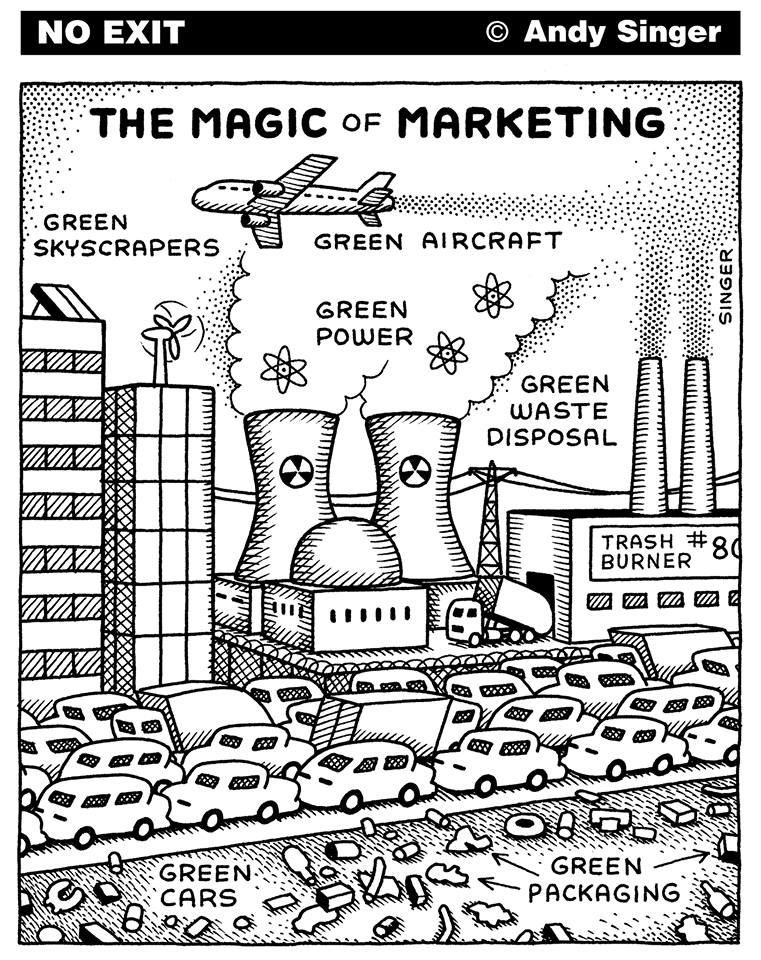
by DGR News Service | Sep 5, 2020 | Strategy & Analysis, The Solution: Resistance
In this article, Suzanna explains how nihilistic relativism has spread across the environmental movement. It has altered our perception of right and wrong, and prevents the environmental organizers from taking a radical stance for the natural world.
This article was originally published August 26th in VT Digger. an off-the-grid farmer who lives in Walden.
Nihilistic Relativism Infects The Green movement
By Suzanna Jones/VT Digger
Last month, the Trump administration gutted the 50-year old National Environmental Policy Act under the guise of “modernizing,” “streamlining” and making the law more “balanced.” Here in Vermont, similar language is being used to justify eviscerating our state’s landmark environmental law, Act 250. But it’s not the ethically- and environmentally-challenged Trump administration proposing the gutting, it’s the unholy alliance between the moderate Scott administration and the Vermont Natural Resources Council.
VNRC, once a staunch defender of Act 250, now supports creating numerous loopholes for harmful development in exchange for tepid forest fragmentation “protections” that would do little to halt further incursions of development into our mountain ecosystems. At the beginning of the 2020 legislative session, VNRC acted more like the Chamber of Commerce than the environmental organization it purports to be.
It lined up developers, lobbyists, and business leaders to testify in favor of their proposed exemptions to Act 250.
One such exemption: removing downtown development from regulatory oversight, with no consideration of the consequences – particularly regarding wastewater issues.
This bill, H.926, will possibly be voted on during an unusual summer session meant to address pandemic and related budget issues. Perhaps gutting Act 250 is being considered now, under cover of Covid, because public awareness and participation are severely limited. After looking over H.926, a lawyer friend of mine asked me, “Why do we now have to defend the environment from environmental organizations?”
It’s a great question.
Part of the answer, of course, involves money. Fifty years ago, when Act 250 and other important protections were enacted, environmental organizations believed it was their role to draw lines in the sand beyond which economic interests could not go. They understood that we could not blindly expand industry, business and commerce into the landbase without inevitably degrading it.
But from the mid-1980s on, moneyed interests began co-opting the environmental movement by supporting groups that embraced “market-based” solutions to environmental problems. As environmental NGOs softened their stance against rampant development, we got “green consumerism,” “carbon trading,” “ethical investment,” “smart growth” and other business-friendly steps in place of genuine environmental protection. This form of “environmentalism” has turned corporations into “environmentalists” but failed to protect the natural world.
Were the leaders of those environmental organizations conscious of what they were doing?
Psychologist Robert Lifton’s work offers some insight. His career focused on examining how ordinary people become involved in projects with horrific consequences. This phenomenon, he explains, emerges from a shared ideology that remains unquestioned – often with a declared higher good or “claim to virtue” justifying it – thereby blinding people to the real-world consequences of their actions. He studied people responsible for atrocities throughout the last century. Expecting to find psychosis and sociopathy prevalent among them, he found something surprising: many were actually nice people. They were well-liked and respected in their communities. They had stable families and were loving parents and grandparents. They weren’t necessarily ideologues nor particularly hate-filled.
What they were was ambitious. Lifton concluded that when one is ambitious in a destructive society, one will participate in that destruction to reap the rewards. His conclusions are a cautionary tale that should alert all of us to look deep within and examine our conduct and motivations. The environmental leaders who espouse “balancing” environmental protections with the need for economic growth are more likely to win major funding, receive invitations to government roundtables, and hold the microphones that shape opinion.
Over time, the result has been that “environmentalism” is no longer about defending nature from the voracious appetite of the ever-expanding human empire, it is about convincing the public that we can continue that destruction as long as growth is cloaked in euphemistic adjectives like “green,” “smart,” “resilient” and “sustainable.”
But why has the public gone along with this shift?
The reason, in part, is that we have been afflicted by a new brand of ethics: nihilistic relativism. Originally identified by Hannah Arendt, nihilistic relativism allows us to deny our complicity because “right” and “wrong” are seen as simply relative measures. If our actions are better than the egregious actions of others, if they are disguised behind empty props such as “mitigation” and “balance,” our consciences are clear while our actions steadily eat away at the biosphere. The result, though, is that we have paved over our hearts and buried our affection for the living natural world that supports us all.
Firmly wrapped in the ideology of economic growth, the global ecocide and ultimate extinction we are hurtling toward is the logical endpoint of this dark pathology. Here in Vermont, nihilistic relativism reassures us that we are far more environmentally aware than Trump or his minions.
Meanwhile it blinds us from seeing that sometimes we are just as dangerous.
Suzanna Jones is an off-the-grid farmer who lives in Walden. This article was originally published August 26th in VT Digger: you can find the original, full article here:
https://vtdigger.org/2020/08/26/suzanna-jones-nihilistic-relativism-infects-the-green-movement/
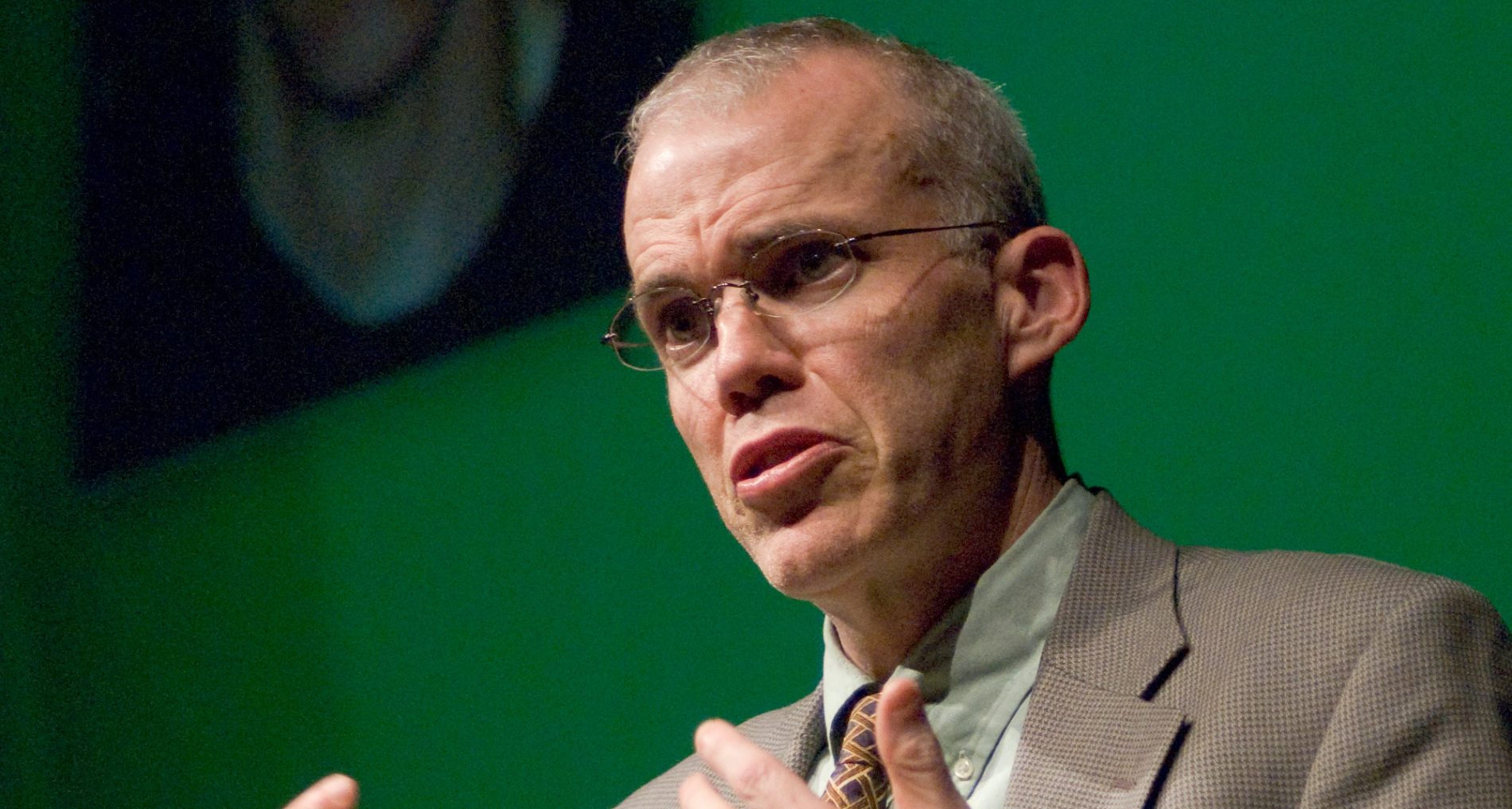
by DGR News Service | Jun 4, 2020 | ANALYSIS, Human Supremacy
Grassroots activist Suzanna Jones observes how even long-time environmentalists can become misled.
Faulty: Bill McKibben’s Crisis Logic
By Suzanna Jones
Vermont has a reputation for producing sturdy New England farm folk – hardscrabble people who lived full lives in challenging conditions. Our neighbors, Frank and Virginia, were prime examples. Living well into their eighties, they never owned a car or a phone, and never went on a vacation; they saved and reused everything, and grew their own food. Despite – or probably because of – the simplicity of their lives, they were happy.
Now there is a different kind of folk in the Green Mountain landscape. You’ll find them rushing to the airport in their hybrid car, smartphone glued to their hands, trying to catch a plane for their vacation abroad. Often well-meaning and ‘progressive’, they tend to look down on people like Frank and Virginia for not being ‘green’ enough. The reality, of course, is that these self-described environmentalists have a far greater impact on the Earth than those older Vermonters did.
Mainstream notions of monetary and career ‘success’ lead us to dismiss simpler ways of life. Unfortunately, this leaves us utterly wedded to the economic system that lies behind all our environmental problems, including climate change.
Crisis Logic
Bill McKibben‘s recent appearance in Hardwick to promote his new book, Falter, got me thinking about this. Back in 2008 McKibben correctly identified our growth-obsessed economy as the source of the ecological collapse we face today, explaining that when the economy grows larger than necessary to meet our basic needs, its social and environmental costs outweigh any benefits.
He pointed out that our consumerist way of life – in which we strive for more no matter how much we already have – is one of the ways corporations keep our bloated economy growing. The irony, he added, is that perennial accumulation does not even make us happy. But now, sadly, McKibben studiously avoids criticizing the very economy he once fingered as the source of our environmental crisis.
During his talk he referred to Exxon’s ‘big lie’: the company knew about climate change long ago but hid the truth. Ironically, McKibben’s presentation did something similar by hiding the fact that his only ‘solution’ to climate change – the rapid transition from fossil fuels to industrial renewables – actually causes astounding environmental damage.
Out of the Back Comes Modernity
Solar power, he said, is “just glass angled at the sun, and out the back comes ‘modernity’.” But solar is much more than just glass. One example? Like wind power, it requires the environmentally devastating – and fossil-fuel based – mining of rare earth metals. And that ‘modernity’ coming out the back? That is the lifestyle that is killing the planet.
McKibben extolled the virtues of Green Mountain Power’s industrial ‘renewable’ developments, failing to mention that GMP sells the Renewable Energy Credits (RECs) from those projects to out-of-state utilities, thereby subsidizing the production of dirty energy elsewhere. He also neglected to say that one of GMP’s parent companies is tar sands giant Enbridge, which owns a $1.5 billion stake in the Dakota Access Pipeline and is currently working to use Vermont as a corridor for future fracked-gas transport.
Therein Lies the Deception
McKibben once claimed that “every turn of the blade” of an industrial wind turbine “reduces fossil fuel consumption somewhere.” When the RECs are sold, however, this is simply untrue. And while the production and installation of every turbine has serious environmental costs, every reduction in consumption really does reduce fossil fuel use somewhere, while simultaneously reducing environmental impacts.
Renewables only make sense in tandem with drastic reductions in energy consumption, and are best implemented through small-scale, grid-free efforts. But what we have instead is corporations continuing to market the psychotic American dream – powered by ‘renewables’! This co-opted response to climate change is no longer about protecting nature from the ever expanding human nightmare, it is about sustaining the comforts and luxuries we feel entitled to. It is business-as-usual disguised as concern for the Earth. It is utterly empty, but it serves the destructive economy.
Though not Mckibben’s intent, this is what he implicitly supports.
Changing the Fuel Does Not Stop Ecocide
Climate change is a crisis, but it is only one of many ways the planet is being destroyed. Changing the fuel that runs the system that is killing the planet is not a solution. An effective response would resemble shifting towards the way Frank and Virginia lived. It won’t look ‘cool’, or stroke the attention-seeking narcissism of social media addicts, but it would have immediate benefits.
That shift will require a major rethinking of our lives and economy; it asks us to have the maturity, courage, humility and wisdom to put nature and her needs first. McKibben deserves credit for sounding the alarm about climate change early on, but now he should tell people the unvarnished truth: that if we cannot sacrifice our comforts, luxuries and rapid mobility because we love this Earth, then there really is no hope.
Suzanna Jones lives off grid on a small farm in Northern Vermont. She has been fighting injustice, destruction of the land, and industrial wind projects for decades and has been arrested several times.
Featured image by Hotshot977, Creative Commons Attribution-Share Alike 3.0 Unported license. To repost this or any other content on this website, please contact newsservice@deepgreenresistance.org.

by DGR News Service | May 22, 2020 | Biodiversity & Habitat Destruction
Grassroots activist Suzanna Jones challenges the idea that green energy is good and rebukes the corporations and ideologically-captured organizations who promote it.
By Suzanna Jones
The recently released documentary Planet of the Humans takes direct aim at the major threat to the Earth.
It does this by asking fundamental questions: can Nature withstand continued industrial extraction; can humans – particularly those in the dominant West – persist in taxing the natural world to fulfill our own ‘needs’ and desires; is ‘green’ energy the savior for our climatic and environmental problems or is it a false prophet distracting us from confronting the gargantuan elephant in the room, what writer Wendell Berry calls “history’s most destructive economy”?
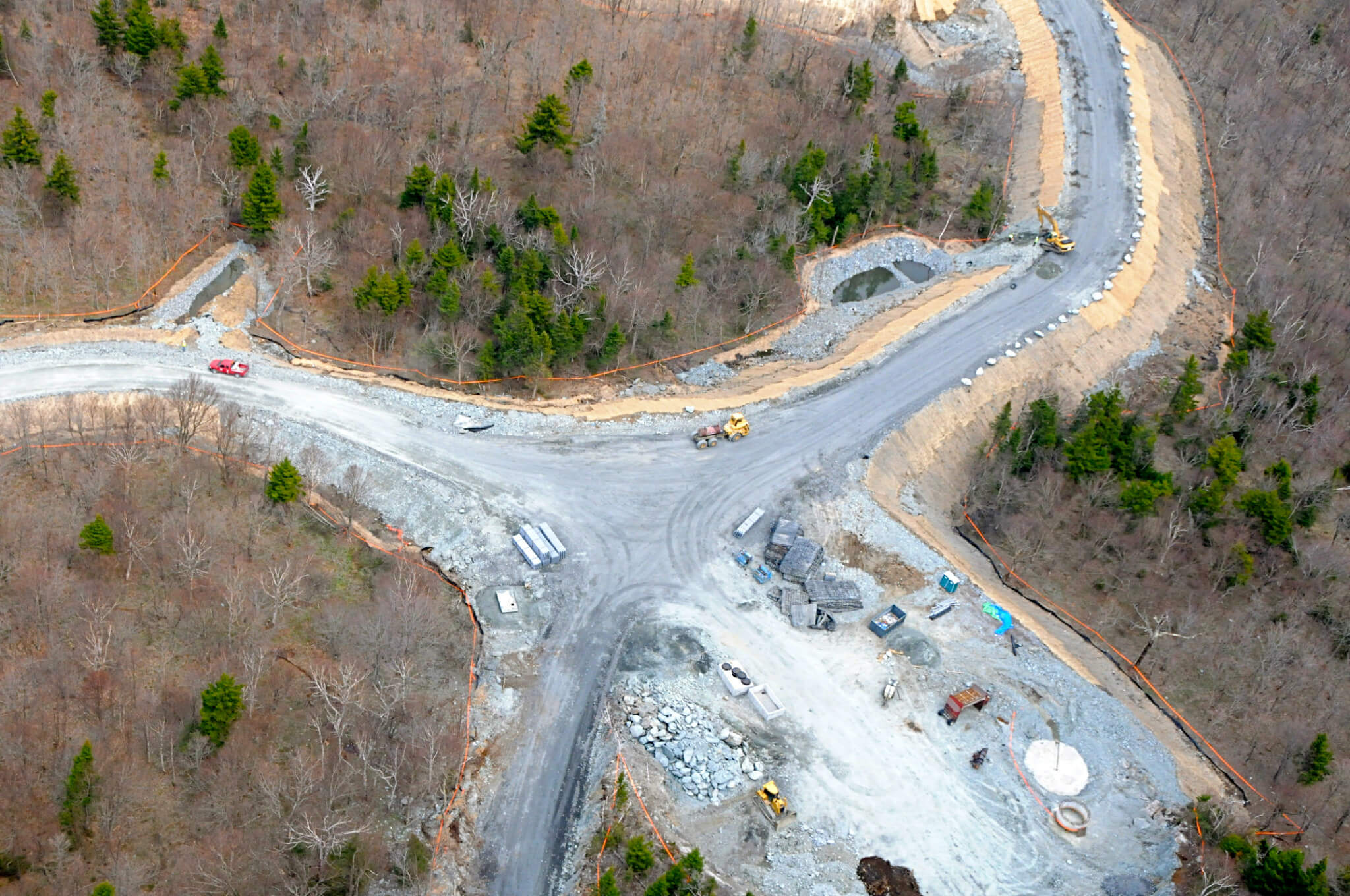
New roads built for the Lowell Wind Energy site in Vermont destroy and fragment important wildlife habitat for black bears, moose, and bobcat among others.
The Hypocrisy of Mainstream “Environmentalism”
Filmmakers Jeff Gibbs, Ozzie Zehner and Michael Moore don’t just ask questions, they highlight the hypocrisies of big shots like Al Gore and the national Sierra Club. Even Vermont comes in for less than flattering commentary. Planet of the Humans depicts Green Mountain Power‘s ridge-destroying Lowell Mountain industrial wind project, Burlington’s McNeil wood-burning electric generating plant, and Middlebury College’s biomass gasification facility as examples of the renewable energy delusion. And Bill McKibben, Middlebury’s Scholar-in-Residence, is cast as a string that connects all three.
The film has struck a nerve. Those depicted unfavorably have reacted. Some who admit to having enjoyed Michael Moore’s filmmaking strategy in the past don’t find him so funny this time. The criticisms reveal how much power and money lie behind the renewables-as-savior myth. With so much at stake, the industry and big environmental organizations have little appetite for discussing or even acknowledging the unsavory side of the technologies. And ultimately, the core issues remain unaddressed; the most important things remain unspoken.
Sustaining the Planet vs. Sustaining Industrial Civilization
Frankly, the green energy ‘movement’ is really about sustaining our way of life and the economic system that it depends upon, not the health of the biosphere. Capitalism is brilliant at co-opting anything that resists it. Green energy – like much of the broader environmental movement – is no exception. It’s business-as-usual in camouflage.
Back when Green Mountain Power’s bulldozing and blasting began at Lowell Mountain, a group of locals organized ‘open-house’ walks up the mountain to view the devastation. Hundreds attended these fall/winter treks. Shock and heartbreak were the usual response. Bill McKibben was personally invited to attend. Though his response was polite, he would not be coming. He dismissed our concern for the mountain as “ephemeral.”

Ephemeral?
That word underscores what has gone so terribly wrong with green energy “environmentalism.” Something is absent. That something? Love. Love of the places and living beings that are suffering or being destroyed so that we can live our electronic, nature-less existence. Affection for the natural, non- human world is missing in the discussions about climate, carbon and techno-fixes. Nothing seems to matter now but humans and their desires.
“Although it’s morally wrong to destroy the land community, people are going to sustain it, not because it’s morally right but because they want to; affection is going to be the determining motive”, Wendell Berry has explained in the past. “Economic constraints might cancel out affection, but genuine affection is going to be the motivating cause.”
The Moral Basis of Organizing for Justice
Without affection, we’re more likely to thoughtlessly sacrifice living beings on the altar of economics. When the film reveals who is paying the ultimate price for our ‘green’ energy consumption, we recognize affection for the casualty it has become. We are half-asleep, anesthetized by the barrage of meaningless marketing, with its hollow premise that we can continue to consume our way to happiness.
As I was planting in the garden this warm, spring day, the returning swallows joyfully zipping overhead made me stop. Usually this ritual is accompanied by the background droning of distant car traffic, but due to the pandemic, the infernal engines were silent. It made me wonder. Can we live in healthy reciprocity with the natural world? Can we make the shared economic sacrifices that are necessary or will we continue to sacrifice Nature? Can we make drastic reductions in consumption and live more local, less materially prosperous, more fulfilling lives? Can we replace modernity’s painful alienation from Nature with a genuine sense of intimacy, affection, meaning and responsibility? Will those in power let us? Will we allow them to decide for us?
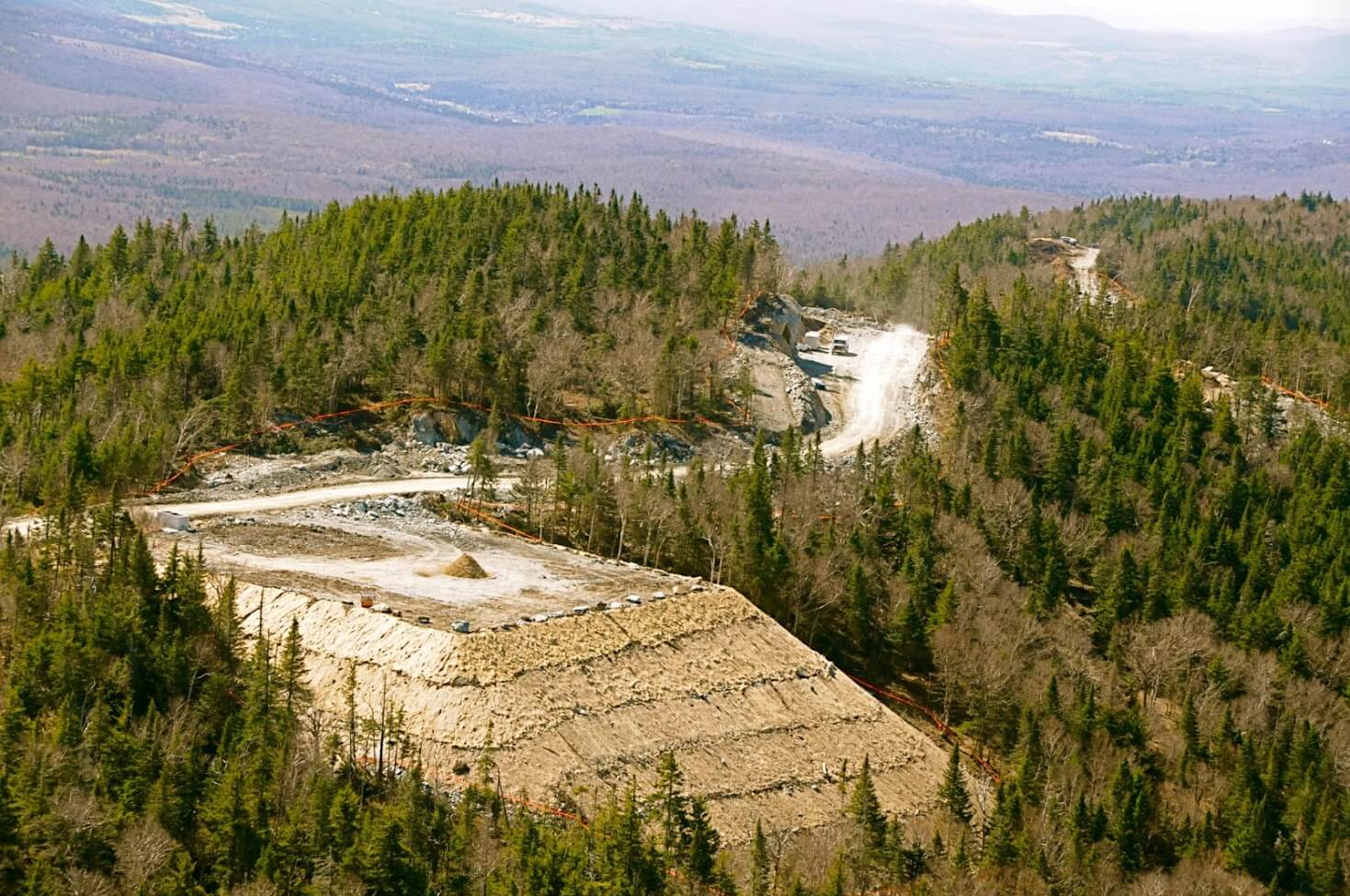
On of 21 wind turbine pads at Lowell Wind Project in Vermont.
Our way of life is inherently unsustainable. We can’t buy or build our way out of this one. Yes, the climate crisis is both undeniable and existential, but it is not the only way the Earth is being destroyed. Simply changing the fuel that powers our destructive, planet-killing system is not a solution.
Planet of the Humans challenges our assumptions and our arrogance. It asks us to face what we have done, experience the grief, and then allow our hearts to consider an entirely new path into the future.
Suzanna Jones lives off grid on a small farm in Northern Vermont. She has been fighting injustice, destruction of the land, and industrial wind projects for decades and has been arrested several times.
Wildlife images by Roger Irwin depict native wildlife near the site of a proposed wind energy facility on Seneca Mountain. That project was canceled due to community organizing in opposition. Aerial photographs by Steve Wright depict Lowell Wind Energy Facility. Check out this photo essay on the impact of “green” energy on mountain landscapes.
To repost this, or any other original DGR content, please contact newsservice@deepgreenresistance.org
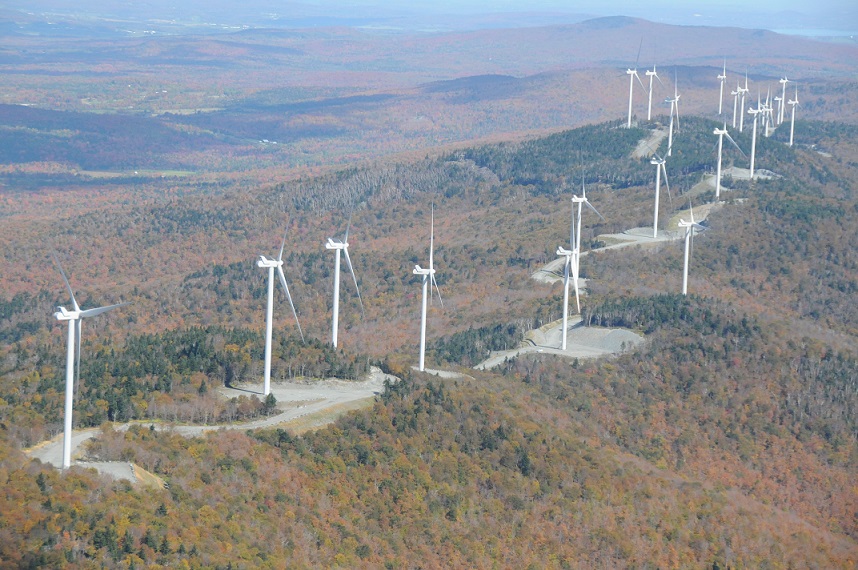
by Deep Green Resistance News Service | Aug 27, 2018 | Biodiversity & Habitat Destruction
by Suzanna Jones / Counterpunch
Walden, Vermont–In his 2008 book Deep Economy, Bill McKibben concludes that economic growth is the source of the ecological crises we face today. He explains that when the economy grows larger than necessary to meet our basic needs – when it grows for the sake of growth, automatically striving for “more” – its social and environmental costs greatly outweigh any benefits it may provide.
Unfortunately, McKibben seems to have forgotten what he so passionately argued just five years ago. Today he is an advocate of industrial wind turbines on our ridgelines: he wants to industrialize our last wild spaces to feed the very economy he fingered as the source of our environmental problems.
His key assumption is that industrial wind power displaces the use of coal and oil, and therefore helps limit climate change. But since 2000, wind facilities with a total capacity equivalent to 350 coal-fired power plants have been installed worldwide, and today there are more – not fewer – coal-fired power plants operating. (In Vermont, the sale of Renewable Energy Credits to out-of-state utilities enables them to avoid mandates to reduce their fossil fuel dependency, meaning that there is no net reduction in greenhouse gas emissions.) At best, industrial wind simply adds more energy to the global supply. And what for? More! More energy than the grid can carry, more idiotic water parks, more snowmaking, more electronic gadgets, more money for corporations.
Why should we spend millions of dollars to destroy wildlife habitat, kill bats and eagles, pollute our headwaters, fill valuable wetlands, polarize our communities, make people sick, mine rare earth metals – just to ensure that we can consume as much or more next year than we did this year?
The costs of industrial wind far outweigh the benefits… unless you are a wind developer. Federal production tax credits and other subsidies have fostered a gold rush mentality among wind developers, who have been abetted by political and environmental leaders who want to appear “green” without challenging the underlying causes of our crises. Meanwhile, average Vermonters find themselves without any ability to protect their communities or the ecosystems of which they are part. The goal of an industrial wind moratorium is to stop the gold rush so we can have an honest discussion on these issues. Why does this frighten proponents of big wind? Because once carefully examined, industrial wind will be exposed for the scam that it is.
McKibben’s current attitude towards the environment has been adopted by politicians, corporations, and the big environmental organizations. Environmentalism has been successfully mainstreamed, at the cost of its soul. This co-opted version isn’t about protecting the landbase from the ever-expanding empire of humans. It’s about sustaining the comfort levels we feel entitled to without exhausting the resources required. It is entirely human-centered and hollow, and it serves corporate capitalism well.
In Deep Economy, McKibben points out that the additional “stuff” provided by an ever-growing economy doesn’t leave people happier; instead, the source of authentic happiness is a healthy connection to nature and community. As Vermonters have already discovered, industrial wind destroys both.
What industrial wind represents should be obvious to everyone: this is business-as-usual disguised as concern for the Earth. Far from genuine “environmentalism”, it is the same profit- and growth-driven destruction that is at the root of every ecological crisis we face.
Suzanna Jones is an off-the-grid farmer living in Walden. She was among those arrested protesting the Lowell wind project in 2011.







